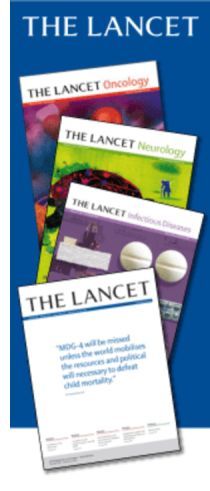 In July, HonestReporting took apart The Lancet medical journal’s collection of articles supposedly examining the state of the Palestinian healthcare system. Our research into the background of a number of contributors to The Lancet’s articles revealed some disturbing information and called into question the credibility of the content, particularly as most of those authors identified were active supporters of the boycott, divestment and sanctions (BDS) campaign against Israel.
In July, HonestReporting took apart The Lancet medical journal’s collection of articles supposedly examining the state of the Palestinian healthcare system. Our research into the background of a number of contributors to The Lancet’s articles revealed some disturbing information and called into question the credibility of the content, particularly as most of those authors identified were active supporters of the boycott, divestment and sanctions (BDS) campaign against Israel.
We demonstrated a politicized anti-Israel agenda in The Lancet. Yet, instead of addressing our very legitimate criticism, the journal’s editor Richard Horton responded in The Lancet’s July 31 edition (available on The Lancet’s Facebook page):
The Lancet is grateful to our colleagues at HonestReporting for providing further international coverage of the research we published recently online, which drew attention to the health predicaments of Palestinians living under Israeli occupation and internal political fracture. With the help of HonestReporting, we have been able to reach a large, new, and largely unaware audience.
We believe that the “large, new, and largely unaware audience” are more likely to be readers who have now been made aware of The Lancet’s anti-Israel bias and abandonment of scientific and medical norms. We also received many communications from medical professionals who expressed their deep concern at The Lancet’s agenda.
But we shouldn’t be surprised. Richard Horton only this week exposed his personal animosity towards Israel in a letter to The Guardian on 24 August in response to an op-ed by Israel’s Ambassador to the UK, Ron Prosor. Some selected excerpts (emphasis added):
Gaza is not a terrorist enclave. It is a vigorous community of 1.4 million people struggling to exist under what the UN still considers to be occupation by Israel. Operation Cast Lead did not target “terrorist infrastructure”. On a visit to Gaza that I made in March this year, with colleagues from the UK, I witnessed the results of indiscriminate bombing of residential communities across the Strip, as well as the results of civilian casualties. …
Gaza is not “a golden opportunity tragically missed”. The people of Gaza are experiencing continued declines in child health, unchecked burdens of chronic disease, shortages of life-saving medical supplies and equipment, and the dramatic erosion of mental health. These unprecedented hardships are a direct consequence of Israel’s disregard for the health and security of people who they, as occupiers, have a legal duty to protect. …
In the classrooms I visited, there was no incitement against Israel. Instead, there was pride in being Palestinian, a plea for the facts of their lives to be told against the propaganda that Prosor repeats.
On one issue, Mr Prosor and I agree. Many Israelis are sceptical and do fear for their futures. But this is largely because it suits politicians to manufacture the scepticism and fear that destroy hopes for peace and justice. If the full truth about the health of people living in the occupied Palestinian territory was more widely known, the international community would no longer tolerate Israel’s apparent indifference.
Much like his journal, Horton
 Ignores Hamas terrorism and violence against its own people as well as Israelis, preferring to believe that the legitimate fear of missiles and mortars from Gaza is the manufactured product of politicians dealing in fear.
Ignores Hamas terrorism and violence against its own people as well as Israelis, preferring to believe that the legitimate fear of missiles and mortars from Gaza is the manufactured product of politicians dealing in fear.- Claims Israel still occupies Gaza despite leaving the territory in 2005.
- Blames the situation in Gaza solely on Israel, placing no responsibility whatsoever on Palestinian actions.
Richard Horton has clinically demonstrated and confirmed that The Lancet is not publishing anti-Israel articles out of naivety but is being guided in a politicized direction from the very top.
We’d also like to thank Richard Horton for bringing HonestReporting’s work to the attention of the medical community – a large, new, and largely unaware audience who will hopefully now see through The Lancet’s insidious agenda.

